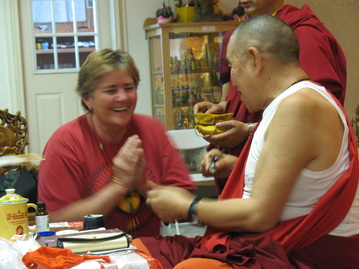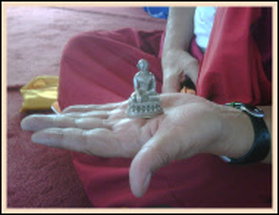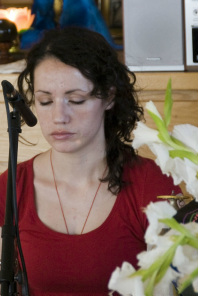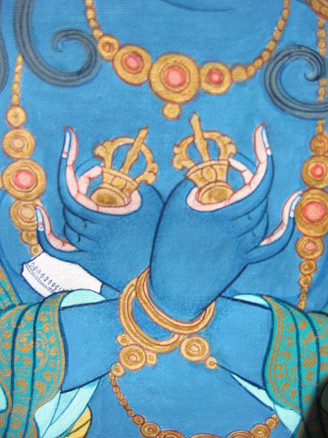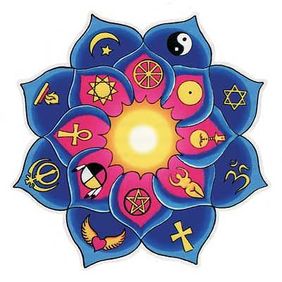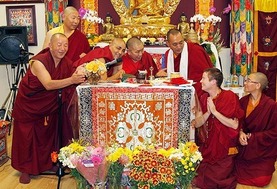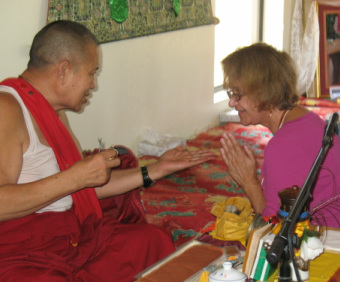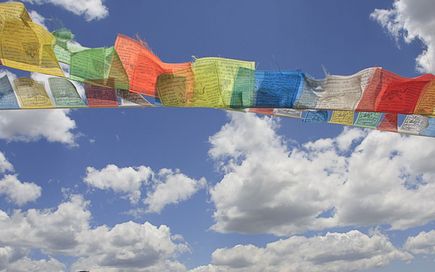What Does It Mean to "Take Refuge"?
|
Ref’uge [.ref-yooj.] noun, verb
— n. 1. shelter or protection, as from the weather or danger; 2. any place, person, action, or thing that offers or appears to offer protection, help, or relief. — vb 3. archaic to take refuge or give refuge to. World English Dictionary Taking refuge is the first step on the Buddhist path, when a person wishes to become a Buddhist. It often occurs as a natural outgrowth of learning about Buddhism and reflecting on what the teachings really mean in light of our human condition. It represents turning toward a genuine spiritual path that can be of benefit not only to ourselves but to others as well.
Why take refuge? “Every day we wake up and tacitly take refuge in something that we think will offer us security and protection…. We take refuge in money, in having things, in winning, in avoiding loss. While there's nothing inherently wrong with external pleasures, when we believe that our happiness depends on them, we're engaging in samsara--a Sanskrit word describing a circular and endless process that results in pain, suffering, and disillusionment. We work hard for what we think we want and when we get it, we don't feel the happiness we expected.” ~ Sakyong Mipham Rinpoche |
|
|
What are we taking refuge in? “Powerful worldly deities, mountains, great trees, Gods, nagas, parents or other relatives cannot give refuge. The reason is that to give refuge one must be free from all fears, suffering and the causes of suffering, and confusion. As ordinary beings are not free from suffering, they cannot be objects of refuge.” ~ Khenchen Konchog Gyaltsen Rinpoche “… it would be like falling into a ditch and asking another who is in it to help you out. You need to ask someone who is standing outside the ditch for help; it is senseless to ask another who is in the same predicament. A refuge capable of protecting from the frights of manifold sufferings cannot also be bound in this suffering but must be free and unflawed.” ~ H. H. Dalai Lama “The Buddha is the one who is completely free from confusion, fear and suffering; the Dharma is the path to achieve Buddhahood, and the Sangha is the only company in which to practice the Dharma.” ~Khenchen Konchog Gyaltsen Rinpoche |
|
|
|
What is the inner meaning of "refuge"?
“The three refuges also have an inner meaning related to the mind. The mind’s primordial nature is totally pure, clear, and enlightened from beginningless time. One’s own pure awareness is the primordial buddha. Buddha actually means the perfect understanding that is free from all deluded and dualistic thinking. This is the absolute buddha. Maintaining the qualities of the primordial nature and radiating them to all sentient beings is the inner meaning of taking refuge in the absolute dharma…. The primordial nature of the mind includes a completely nonviolent attitude of infinite loving-kindness and infinite compassion toward all beings, and these qualities are known as the Dharma. The inner sangha is also contained within the mind. Sangha is a Sanskrit word meaning “inseparable.” This refers to the inseparability of clarity and emptiness as the true nature of the mind.... Clarity and emptiness are always present, and that is the meaning of the absolute sangha.“ ~ Khenchen Palden Sherab Rinpoche & Khenpo Tsewang Dongyal Rinpoche, The Buddhist Path. “We talk about the Three Jewels. They are actually contained within your mind. Your inner Buddha is your wisdom awareness, your inner Dharma is love and compassion. Although the Buddha taught 84,000 different Dharma teachings, their essence is love. If you give rise to love, wisdom awareness will naturally arise... If you abandon the causes of suffering then there is no basis of suffering.“ ~ H. E. Garchen Rinpoche |
|
|
Once I take refuge, am I committed to that lama & lineage?
Formally taking refuge with a lama does not imply necessarily committing yourself to following him/her as your personal spiritual guide. It is important, of course, to maintain respect and gratitude toward that lama as the one who opened the door to your new direction in life. Furthermore, you are not obligated to follow your refuge lama’s lineage either. The refuge is in the Three Jewels, not a specific lama or lineage. |
|
